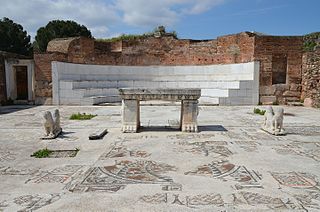
The Epistle to the Romans is the sixth book in the New Testament, and the longest of the thirteen Pauline epistles. Biblical scholars agree that it was composed by Paul the Apostle to explain that salvation is offered through the gospel of Jesus Christ.

Paul, commonly known as Paul the Apostle and Saint Paul, was a Christian apostle who spread the teachings of Jesus in the first-century world. For his contributions towards the New Testament, he is generally regarded as one of the most important figures of the Apostolic Age, and he also founded several Christian communities in Asia Minor and Europe from the mid-40s to the mid-50s AD.
Antisemitism and the New Testament is the discussion of how Christian views of Judaism in the New Testament have contributed to discrimination against Jewish people throughout history and in the present day.

Pauline Christianity or Pauline theology, otherwise referred to as Gentile Christianity, is the theology and form of Christianity which developed from the beliefs and doctrines espoused by the Hellenistic-Jewish Apostle Paul through his writings and those New Testament writings traditionally attributed to him. Paul's beliefs were rooted in the earliest Jewish Christianity, but they deviated from this Jewish Christianity in their emphasis on inclusion of the Gentiles into God's New Covenant and in his rejection of circumcision as an unnecessary token of upholding the Mosaic Law.

The Council of Jerusalem or Apostolic Council is a council described in chapter 15 of the Acts of the Apostles, allegedly held in Jerusalem around c. 48–50 AD.

Jewish Christians were the followers of a Jewish religious sect that emerged in Judea during the late Second Temple period. These Jews believed Jesus to be the prophesied Messiah, but maintained the observance of Jewish law. Jewish Christianity is the foundation of Early Christianity, which later developed into Catholic and Eastern Orthodox Christianity. Christianity started with Jewish eschatological expectations, and it developed into the worship of Jesus as the result of his earthly ministry, his crucifixion, and the post-crucifixion experiences of his followers. Modern scholarship is engaged in an ongoing debate as to the proper designation for Jesus' first followers. Many see the term Jewish Christians as anachronistic given that there is no consensus on the date of the birth of Christianity. Some modern scholars have suggested the designations "Jewish believers in Jesus" or "Jewish followers of Jesus" as better reflecting the original context.

The Judaizers were a faction of the Jewish Christians, both of Jewish and non-Jewish origins, who regarded the Levitical laws of the Old Testament as still binding on all Christians. They tried to enforce Jewish circumcision upon the Gentile converts to early Christianity and were strenuously opposed and criticized for their behavior by the Apostle Paul, who employed many of his epistles to refute their doctrinal positions.

Most scholars who study the historical Jesus and early Christianity believe that the canonical gospels and the life of Jesus must be viewed within their historical and cultural context, rather than purely in terms of Christian orthodoxy. They look at Second Temple Judaism, the tensions, trends, and changes in the region under the influence of Hellenism and the Roman occupation, and the Jewish factions of the time, seeing Jesus as a Jew in this environment; and the written New Testament as arising from a period of oral gospel traditions after his death.
Hyam Maccoby was a Jewish-British scholar and dramatist specialising in the study of the Jewish and Christian religious traditions. He was known for his theories of the historical Jesus and the origins of Christianity.

Paula Fredriksen is an American historian and scholar of early Christianity. She held the position of William Goodwin Aurelio Professor of Scripture at Boston University from 1990 to 2010. Now emerita, she has been distinguished visiting professor in the Department of Comparative Religion at the Hebrew University of Jerusalem, since 2009.

A curse tablet is a small tablet with a curse written on it from the Greco-Roman world. Its name originated from the Greek and Latin words for "pierce" and "bind". The tablets were used to ask the gods, place spirits, or the deceased to perform an action on a person or object, or otherwise compel the subject of the curse.
Early criticism of Judaism and its texts, laws, and practices originated in inter-faith polemics between Christianity and Judaism. Important disputations in the Middle Ages gave rise to widely publicized criticisms. Modern criticisms also reflect the inter-branch Jewish schisms between Orthodox Judaism, Conservative Judaism, and Reform Judaism.

The Mosaic covenant or Law of Moses – which Christians generally call the "Old Covenant" – played an important role in the origins of Christianity and has occasioned serious dispute and controversy since the beginnings of Christianity: note for example Jesus' teaching of the Law during his Sermon on the Mount and the circumcision controversy in early Christianity.

God-fearers or God-worshippers were a numerous class of Gentile sympathizers to Hellenistic Judaism that existed in the Greco-Roman world, which observed certain Jewish religious rites and traditions without becoming full converts to Judaism. The concept has precedents in the proselytes of the Hebrew Bible.
The controversy on religious male circumcision in early Christianity has played an important role in the history of Christianity and Christian theology.
Christianity began as a Second Temple Judaic sect in the 1st century in the Roman province of Judea, from where it spread throughout and beyond the Roman Empire.

Since the 1970s, scholars have sought to place Paul the Apostle within his historical context in Second Temple Judaism. Paul's relationship to Judaism involves topics including the status of Israel's covenant with God and the role of works as a means to either gain or keep the covenant.

Christianity in the 1st century covers the formative history of Christianity from the start of the ministry of Jesus to the death of the last of the Twelve Apostles and is thus also known as the Apostolic Age. Early Christianity developed out of the eschatological ministry of Jesus. Subsequent to Jesus' death, his earliest followers formed an apocalyptic messianic Jewish sect during the late Second Temple period of the 1st century. Initially believing that Jesus' resurrection was the start of the end time, their beliefs soon changed in the expected Second Coming of Jesus and the start of God's Kingdom at a later point in time.
Early Christianity, otherwise called the Early Church or Paleo-Christianity, describes the historical era of the Christian religion up to the First Council of Nicaea in 325. Christianity spread from the Levant, across the Roman Empire, and beyond. Originally, this progression was closely connected to already established Jewish centers in the Holy Land and the Jewish diaspora throughout the Eastern Mediterranean. The first followers of Christianity were Jews who had converted to the faith, i.e. Jewish Christians. Early Christianity contains the Apostolic Age and is followed by, and substantially overlaps with, the Patristic era.
Markus Bockmuehl is a biblical scholar specialising in Early Christianity. He has been the Dean Ireland's Professor of the Exegesis of Holy Scripture at the University of Oxford since 2014, and a Fellow of Keble College, Oxford, since 2007.










